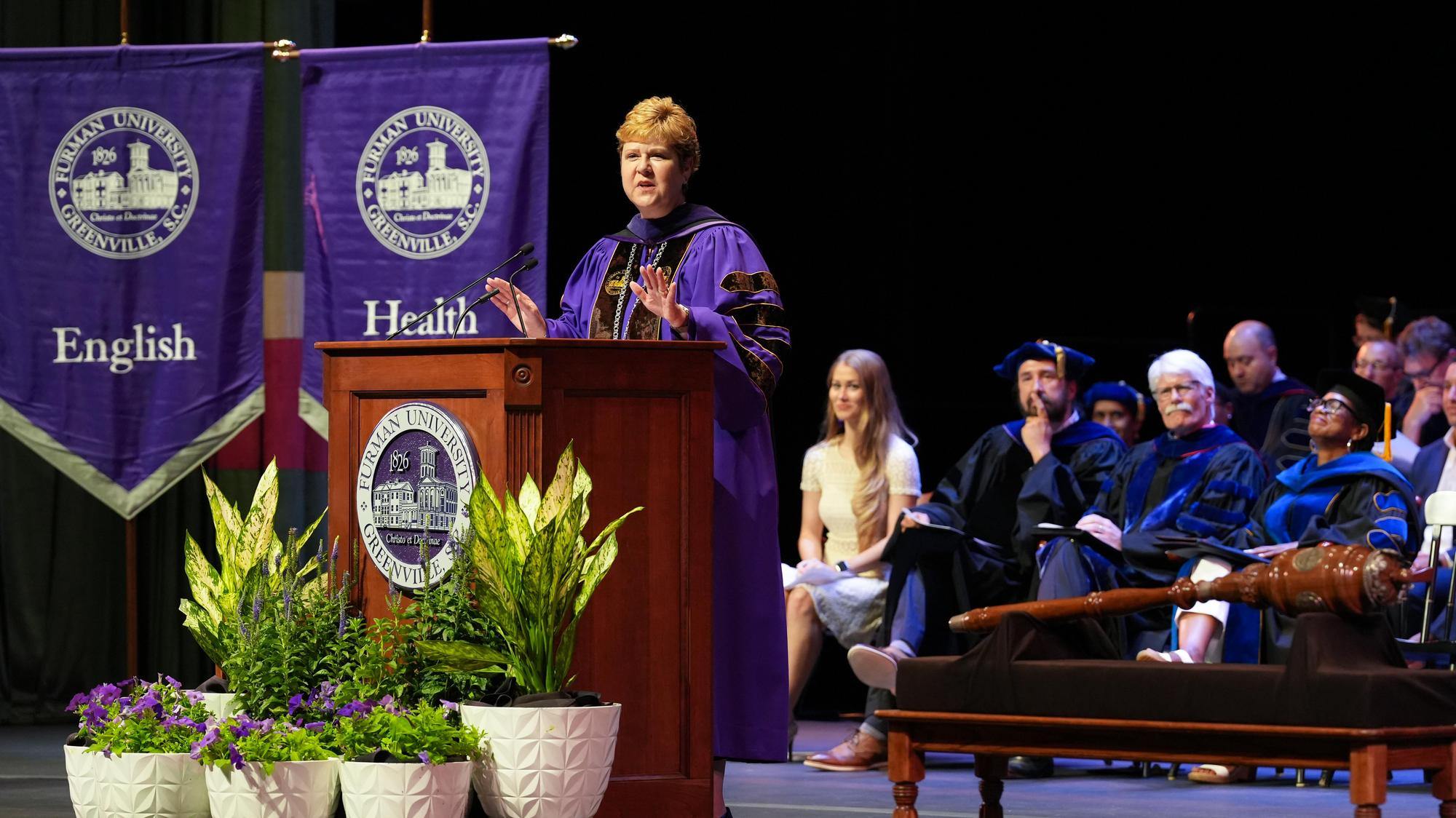Opening Convocation remarks by Furman University President Elizabeth Davis

Opening Convocation 2023
Welcome by Elizabeth Davis, president of Furman University
Good morning, and welcome to the Fall 2023 Opening Convocation. We are honored to have you with us as we embark on a new academic year at Furman. Please join me in thanking our brass quintet for our opening music.
We gather this morning to underscore the purpose and expectations of academic life at our university, and to honor those among us – students, faculty, and staff – whose achievements inspire us.
In so doing, we seek to fulfill the call articulated in our Values Statement. And I quote, “We aspire to advance thriving communities that honor inquiry, promote diversity, strive for equity, appreciate beauty, and act as responsible stewards of our planet. These aspirations inspire our vision and shape our mission, calling us to meet the challenges and responsibilities of a complex, diverse, and rapidly changing world with courage, moderation, justice, wisdom, and humility.”
Each of those we honor today reflect this ideal. And we are glad you are here to participate in this community celebration of their accomplishments.
Before we begin, I would like to recognize Kevin Byrne, the chair of Furman’s Board of Trustees and a member of our platform party. We are also happy to have with us trustees Tony McDade and Jason Richards and trustee emeriti Carl Kohrt and David Ellison.
To our faculty, staff, and returning students joining us today, welcome back. To our incoming students, welcome to your new home. We are so glad you are here.
Believe it or not, I remember being your age. It was just a few years ago. I left my family in New Orleans to become a Baylor Bear, and when my mom dropped me off in Waco, Texas, I was sure of at least two things. The first was that I knew I had a lot to learn academically. There were buildings full of knowledge just waiting for me to soak up as much of it as I could. My other certainty was that I was firmly grounded in my beliefs, and my worldview was complete. Yet all that I knew about the world was learned, largely, second-hand, informed by my parents, my school, and my church. I had not lived outside of Louisiana and Texas. I had not travelled internationally. I hadn’t spent a lot of time with people who looked very different or lived differently from me.
In reality, there was a lot about the world, and its people, that I did not know.
In the 1980s, it would have been heretical for me to question my parents, or the church, or my high school. When I questioned my mom or dad, they often said, “Because I said so.” That was the end of the conversation. Doubting authority was wrong. That’s why some people in my generation have been a little slow to develop a broader worldview.
But this is your generation’s day. If you don’t already know, I’ll tell you now. Do not settle for “because I said so.” It is not an acceptable answer when you’re in college. Your Furman professors are quite proficient at teaching you how to think. Not what to think, but how to question, to seek knowledge and understanding beyond “because I said so.” I encourage each one of you to challenge the beliefs you arrived here with, just as I eventually challenged mine. Not to change your values, but to deepen your understanding of yourself and your place in the world. We call this reflection, and it is core to The Furman Advantage. Indeed, it is inscribed in our values statement.
I also encourage you to explore others’ beliefs, their values, to better understand them, and how you can work together in the world.
We are in a difficult political and social climate, and the temperature of debate and rhetoric will continue to rise as we enter the next election cycle. Too often, discussion is reduced to name calling and labeling.
You can expect to encounter differences of opinion in college and throughout life. We encourage, even foster differences at Furman. Your professors will also present you information, data, facts and theories. What you do with that information is up to you. But when you engage with each other, and with the world, don’t react emphatically until you’ve listened empathically. Listening with empathy is a skill, which means it improves with practice. So is engaging in conversations with respect, and engaging in a way that honors the humanity of everyone involved. Making sure the person you’re talking with feels welcomed, like they belong in the conversation.
You will hear more about this and a new, related initiative from Dr. King and Dr. Nelsen.
Welcome to Furman. I look forward to watching you grow as scholars and as individuals.